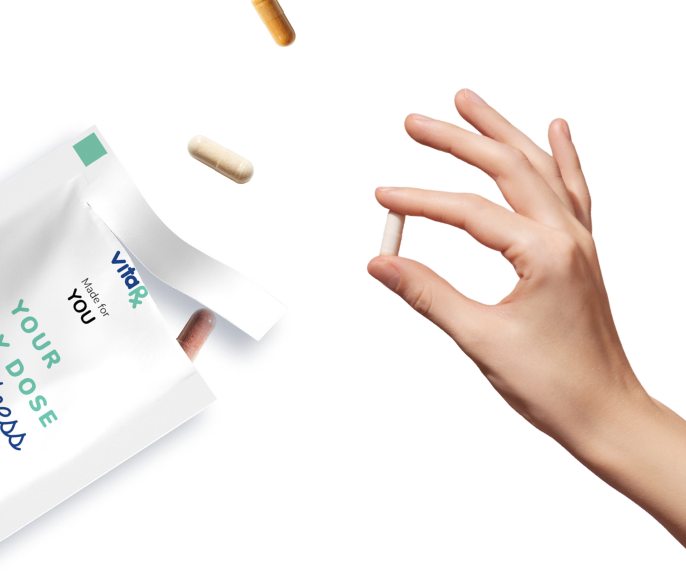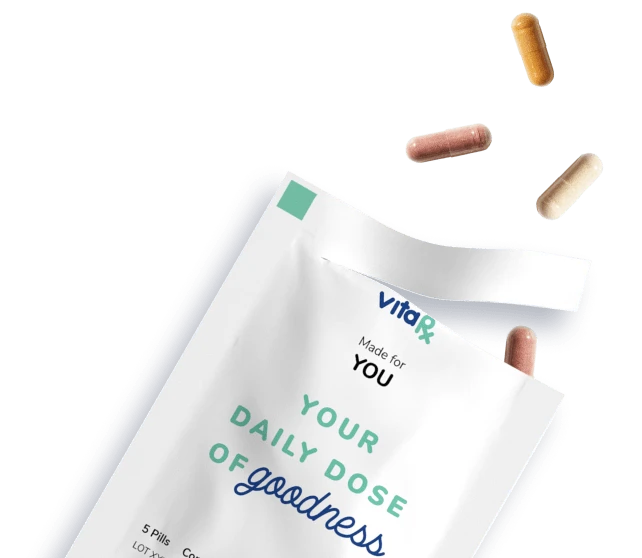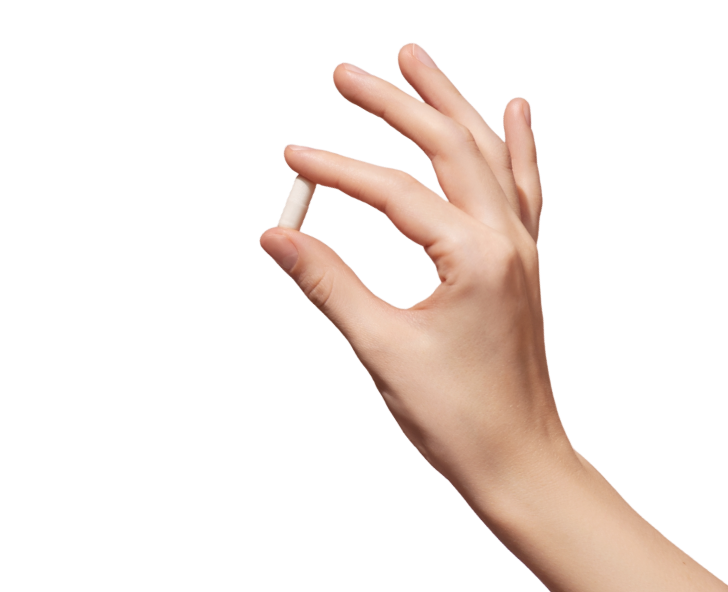Last update: March 25, 2025
12 minute read
10 Best Vitamins and Supplements for Energy and Fatigue
Boost your day with our top 10 energy-boosting vitamins and supplements, perfect for tackling fatigue and feeling energized.

By Stephanie Wright, RN, BSN
Edited by Dr. Jacquie Leone, NMD, HN

Feeling like you're running on empty? What if there was a way to naturally boost your energy and kick that fatigue to the curb? This post will introduce you to the best vitamins and supplements for energy and fatigue. You'll learn how specific nutrients can fuel your body, help you keep your energy level, and provide support for those moments when your get-up-and-go seems to have got up and left.
Key takeaways
- Vitamin B12, vitamin D, and magnesium are popular supplements for boosting energy and combating fatigue
- Keeping a balanced lifestyle, including proper nutrition and sleep, is necessary alongside supplements
- Consult with healthcare providers before beginning any supplement routine to ensure safety and efficacy
What vitamins and supplements can boost your energy?
If you usually feel drained or slow, it could mean your body is crying out for certain nutrients. Here's a curated list of the top vitamins and supplements that have been clinically researched for their energy-boosting properties. Combining these into your daily routine, with guidance from health professionals, could help you say goodbye to those awful energy slumps.
1. Vitamin B12
Vitamin B12 is an essential nutrient for the growth and repair of your body’s tissues. It can also help boost your energy and reduce fatigue.
Studies have shown that taking vitamin B12 supplements can improve energy levels and reduce feelings of tiredness and weakness. For example, studies found that taking vitamin B12 supplements for 3 months improved energy levels and reduced their fatigue compared to a placebo in adults.
Another study of 100 people found that taking vitamin B12 supplements for six weeks increased their energy levels and reduced their fatigue compared to a placebo. Vitamin B12 may work by helping your body convert food into energy more efficiently, which can help you feel more alert and focused.
It’s found naturally in animal products, like meat, fish, eggs, and dairy, but it can also be taken as an oral supplement or injection. So, adding vitamin B12-rich foods to your diet or taking vitamin B12 supplements can be a simple and effective way to support your energy levels and overall health.
2. Vitamin B complex
Vitamin B complex is a group of the most important B vitamins, with many roles in your body. While most people get enough through their diet, factors like age, pregnancy, and health conditions may lead to a need for extra B vitamins. Supplements containing all 8 B vitamins are called B-complex vitamins.
B vitamins, found in foods like dark green leafy vegetables, avocados, fish, bananas, and chicken, can help reduce stress by regulating nerves and brain cells. Key stress-fighting players are B5 and B6, where B5 manages cortisol production during chronic stress, and B6 is involved in important body functions like amino acid metabolism, red blood cell production, and the creation of neurotransmitters.
B-complex supplements may relieve stress, enhance cognitive performance, and alleviate symptoms of depression and anxiety. Dosage varies, and it's crucial to consult your healthcare provider before trying any new supplement, especially if you have health conditions or take medications.
3. Vitamin C
Vitamin C is an essential nutrient that can help boost your energy and reduce fatigue. Studies have shown that taking vitamin C supplements can improve energy levels and reduce feelings of tiredness and weakness. Vitamin C helps your body convert food into energy more efficiently, which can help you feel more alert and focused.
Vitamin C is found naturally in many fruits and vegetables, like oranges, strawberries, kiwi fruit, bell peppers, broccoli, kale, and spinach. So, adding vitamin C-rich foods to your diet or taking vitamin C supplements may be a simple and effective way to support your energy levels and overall health.
Vitamin C is also a powerful antioxidant that can strengthen your body’s natural defenses. Antioxidants are molecules that boost the immune system.
They do so by protecting cells from harmful molecules called free radicals. When free radicals accumulate, they can promote a state known as oxidative stress, which has been linked to many chronic diseases. The recommended daily intake for vitamin C is 75 mg for women and 90 mg for men.
VitaRx Tip
While it’s commonly advised to get vitamin C intake from foods, many people turn to supplements to meet their needs. However, it's always best to talk to your doctor before taking any new supplement.
4. Vitamin D
Known as the 'sunshine vitamin,' Vitamin D is crucial for immune health and energy. Taking supplements can boost energy levels and reduce tiredness.
Vitamin D helps calcium absorption, vital for building and maintaining healthy bones and teeth. While sunlight is a natural source, eating vitamin D-rich foods or supplements can help support energy levels and overall health.
It's also a powerful antioxidant, strengthening the immune system by protecting cells from free radicals linked to chronic diseases and certain cancers. The recommended daily intake is 15-20 mg for most adults. While sunlight is a common source, supplements are an option, but consulting with a healthcare provider is always essential.
5. Magnesium
Magnesium, a vital mineral, regulates energy levels and fights fatigue. Studies suggest that magnesium supplements can boost energy and reduce tiredness.
It helps convert food into energy efficiently, promoting alertness and focus. Natural sources include nuts, seeds, whole grains, and leafy green vegetables.
Adding these foods or taking magnesium supplements can support energy levels and overall health. Magnesium is also a powerful antioxidant, strengthening the immune system by protecting cells from harmful free radicals. The recommended adult daily intake is 400-420 mg for men and 310-320 mg for women.
6. Iron
Your body uses iron to fight fatigue, boost energy, and produce red blood cells. This essential mineral plays a crucial role in carrying oxygen to all parts of your body through your red blood cells, helping you feel more energetic.
When you have enough iron, your body can make the hemoglobin it needs to transport oxygen, so it's like giving your body the fuel it needs to work at its best. Studies have shown that getting the right amount of iron can actually improve energy levels, reduce tiredness and weakness, and help prevent anemia.
You can find iron in foods like red meat, poultry, fish, beans, and leafy green vegetables. So, eating these foods or taking iron supplements effectively supports your energy levels and overall health. Iron doesn't just stop at giving you energy, it also helps your muscles work properly, making you feel more alert and ready to take on the day.
7. Rhodiola rosea
Rhodiola rosea is like a natural energy booster for your body, helping kick fatigue to the curb. This plant root has been used for ages to increase stamina and fight off fatigue. Rhodiola rosea works by acting on the stress response system in your body, making it more resilient to stressors and reducing feelings of exhaustion.
Studies have suggested that this herb can boost your mood, reduce fatigue, and improve brain function, making it a go-to for those looking to up their energy levels. It's like a pick-me-up for both the body and mind!
You can find Rhodiola rosea in supplement form, and some people also enjoy it as a tea. So, whether you're sipping on a cup of Rhodiola rosea tea or taking it as a supplement, it can greatly support your energy levels and overall health.
8. Ashwagandha
Ashwagandha is an herbal medicine used for centuries in traditional medicine to improve overall well-being. Ashwagandha is known for its adaptogenic properties, meaning it helps your body adapt to stress and promotes balance.
Studies have shown that ashwagandha can boost endurance and muscle gains from working out. It does this by supporting the adrenal glands, which play a role in your ability to manage stress and energy production. This herb also helps regulate cortisol, the stress hormone, which, when imbalanced, can contribute to fatigue.
VitaRx Tip
You can easily add ashwagandha to your routine by taking it in supplement form or adding it to your favorite beverages. Whether you're living with everyday tiredness or looking for a natural energy boost, ashwagandha may be your solution.
9. Coenzyme Q10 (CoQ10)
CoQ10 is made naturally in your body and plays a key role in energy production in your cells, helping create ATP. ATP in cells is like gasoline for cars, it makes them go.
This helps give you an energy boost, supports muscle repair, keeps your immune and nervous systems in check, maintains heart health, and potentially even slows down signs of aging. CoQ10 also helps your body defend against oxidative stress, the natural wear and tear in your cells.
When there's not enough CoQ10, it can lead to lower energy levels, especially in your muscles, causing fatigue. So, having enough CoQ10 helps keep things running smoothly and helps you feel your best!
10. Creatine
Creatine is a popular supplement for people who are looking for a boost to their workout. It helps provide more energy during intense workouts.
This amino acid is already created in your body and stays in your muscles. It's important because it helps make ATP, which gives your muscles energy.
When you take extra creatine, it adds to the creatine already in your muscles. This means more ATP production during exercise.
That's great because it can improve your performance, make you last longer during workouts, and help you recover faster after exercising. Taking creatine is typically safe and doesn't cause problems. In fact, it's a good idea to take creatine every day to ensure your muscles always have enough.
Dos and don'ts of taking supplements for energy and fatigue
When it comes to managing your energy levels, dos and don’ts can make an important difference. Here's a handy guide to help you make the best choices for maintaining energy throughout the day.
Do’s
Get regular, quality sleep
Keep healthy hydration
Engage in regular physical activity
Manage stress effectively
Eat a nutrient-rich, balanced diet
Don’ts
Skip meals or rely on sugary snacks
Ignore signs of stress or burnout
Overuse stimulants like caffeine
Overlook potential medical issues that cause fatigue
Sit for prolonged periods without movement
More tips for boosting energy and combating fatigue
Aside from the top vitamins and supplements that can help boost your energy levels, you can use many other strategies for added zest. Remember, your bodies are complex systems that respond to a variety of healthy habits, so consider these extra suggestions as a part of a comprehensive approach to beat tiredness.
- Stay hydrated by drinking plenty of water throughout the day to prevent dehydration, a common cause of fatigue.
- Add moderate exercise to your routine to improve blood flow and energy levels.
- Prioritize quality sleep and keep a consistent sleep schedule to make sure your body can recover and recharge.
- Reduce stress through relaxation techniques like meditation, yoga, or deep-breathing exercises to help you feel calmer and happier.
- Eat balanced meals with various nutrients to fuel your body and stabilize your energy.
Advantages and disadvantages of taking supplements for energy and fatigue
When trying to improve stamina and alertness, supplements can play a crucial role. However, it's important to balance expectations and understand the advantages and disadvantages of relying on supplementation for energy.
Frequently asked questions (FAQ)
Here are some of the most frequently asked questions about the best supplements for energy and fatigue.
Final thoughts
In our busy everyday lives, it's easy to reach for quick fixes like caffeine. Yet, as we've learned, there are lots of ways to boost your energy in the form of vitamins and supplements that can help you recharge without the unwanted side effects.
Embracing these alternatives, along with lifestyle changes, can lead us to a healthier way of living. Remember that the journey to better health is personal. With each positive step, you're investing in a brighter, more energized future.
Sources and references
- Vitamin B12 (Cobalamin) - StatPearls - NCBI Bookshelf
- Effects of Vitamin B12 Supplementation on Cognitive Function, Depressive Symptoms, and Fatigue: A Systematic Review, Meta-Analysis, and Meta-Regression
- Vitamins and Minerals for Energy, Fatigue and Cognition: A Narrative Review of the Biochemical and Clinical Evidence
- Vitamin C - Health Professional Fact Sheet
- Magnesium - Health Professional Fact Sheet
- Influence of iron supplementation on fatigue, mood states and sweating profiles of healthy non-anemic athletes during a training exercise: A double-blind, randomized, placebo-controlled, parallel-group study - PMC
- The Effectiveness of Rhodiola rosea L. Preparations in Alleviating Various Aspects of Life-Stress Symptoms and Stress-Induced Conditions—Encouraging Clinical Evidence - PMC
- Ashwagandha: Is it helpful for stress, anxiety, or sleep? - Health Professional Fact Sheet
- Coenzyme Q10 supplementation: Efficacy, safety, and formulation challenges - Arenas‐Jal
- The Potential Role of Creatine in Vascular Health
Author

Stephanie Wright
Stephanie brings over 13 years of diverse nursing experience to the table, having honed her expertise in critical care, mental health, and utilization management. Her journey as a registered nurse across these various healthcare sectors underscores her adaptability and deep commitment to patient care.
Fact checker

Dr. Jacquie Leone
Dr. Leone holds a BA in Psychology, a Doctorate in Naturopathic Medicine, and board certification in holistic nutrition. In addition to practicing medicine, Dr. Leone has developed and currently teaches science and nutrition courses for a nationally accredited institution. She specializes in chronic illness, gastrointestinal dysregulation, inflammatory conditions, and mental health. Her unique approach combines the wisdom of Eastern medicine with the technology and science of Western medicine, offering an integrative approach heavily focused on functional medicine.
At VitaRx, we're not just passionate about our work — we take immense pride in it. Our dedicated team of writers diligently follows strict editorial standards, ensuring that every piece of content we publish is accurate, current, and highly valuable. We don't just strive for quality; we aim for excellence.
Related posts
While you're at it, here are some other relevant articles you might be interested in.

Get your personalized vitamin recommendations in less than
5 minutes.
Get your personalized vitamin recommendations in less than
5 minutes.









